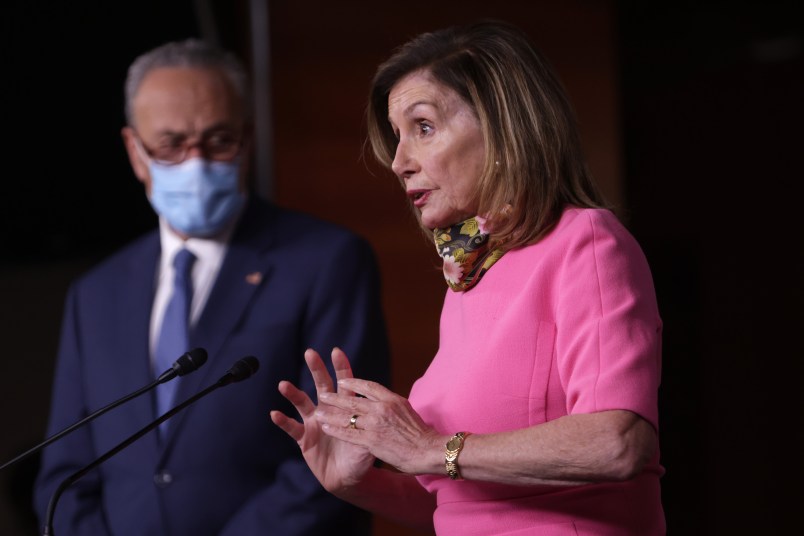House Speaker Nancy Pelosi (D-CA) said Thursday that during a call with White House Chief of Staff Mark Meadows, she offered to drop the price tag on the top-line spending for COVID-19 relief legislation to $2.2 trillion, well down from the original $3.4 trillion.
Meadows, Pelosi said, rejected the offer.
The 25-minute phone call was the first significant contact the two have had since negotiations fell apart earlier this month.
“Originally, House and Senate Democrats made clear we would be willing to cut a trillion dollars if the White House would add a trillion for a bill,” she said. “In order to meet in the middle, we have now said we would be willing to go to $2.2 trillion to meet the needs of the American people.”
“Democrats are willing to resume negotiations once Republicans start to take this process seriously,” she added.
Weeks ago, Pelosi and Senate Minority Leader Chuck Schumer (D-NY) offered to go down to $2.4 trillion from their initial $3.4 trillion proposal, if Meadows and Treasury Secretary Steve Mnuchin went up from $1 trillion to $2 trillion. The White House team rejected the compromise, causing the talks to break down.
There was some chatter that emergency funding for the USPS would serve as a vehicle to cram in pieces of economic relief. Some Democrats have reportedly aired their view that Pelosi should allow for this kind of “piecemeal” approach, one Meadows and Mnuchin have been pushing.
The Democrats rejected the idea though; Pelosi and Schumer have been candid about their concern that the White House will allow pieces of the economic relief package, like the unemployment insurance benefit, to pass and then abandon the negotiating table. The House passed a bill to give the USPS $25 billion last weekend, but Senate Republicans have been whipping against it.
Meanwhile, Meadows has been taking to the media circuit to proclaim the White House’s willingness to return to dealmaking.
“It’s really been Speaker Pelosi really driving this train as a conductor more so than really anybody,” Meadows told Politico on Wednesday. “And I think privately she says she wants a deal and publicly she says she wants a deal, but when it comes to dealing with Republicans and the administration, we haven’t seen a lot of action.”
Republicans have been working on a “skinny” bill that could possibly be attached to legislation to fund the government at the end of September. It would include continuing the unemployment benefit at $300 a week — down from the original $600 a week — until the end of December, as well as money for the Paycheck Protection Program and $10 billion for the USPS.
However, most of the funds included fall far short of what Democrats say is needed as the country battles a pandemic and the resulting economic devastation.
The next organic date to force further negotiations is September 30 when Congress will have to either approve a new budget or, more likely, agree on a continuing resolution to keep the government funded at current levels for a few more months.







Meanwhile:
Every D on any interview on any question needs to slip in the FACT that Dems have offered compromise and the R’s refused! Every interview.
Surprise surprise
It is very good that the Democrats are offering compromise while sticking to what they think is necessary…it will hang it around the necks of Republicans as the evictions and unemployment numbers get worse, and poor people start to see their lives unravel. It’s very possible Republicans decide to stick it out until the election, hoping that they can keep the lid on until then…but when we start hearing about millions of people who are losing everything it will be too late for them to do anything to save themselves.
Ouch!